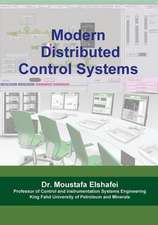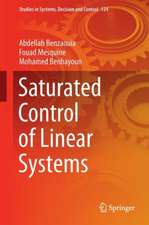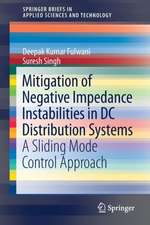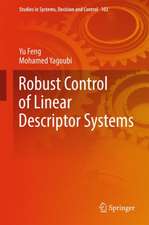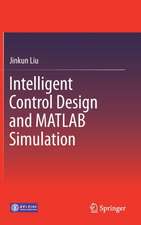Advanced Takagi‒Sugeno Fuzzy Systems: Delay and Saturation: Studies in Systems, Decision and Control, cartea 8
Autor Abdellah Benzaouia, Ahmed El Hajjajien Limba Engleză Hardback – iul 2014
Control saturations are taken into account within the fuzzy model. The concept of positive invariance is used to obtain sufficient asymptotic stability conditions for the fuzzy system with constrained control inside a subset of the state space.
The authors also consider the non-negativity of the states. This is of practical importance in many chemical, physical and biological processes that involve quantities that have intrinsically constant and non-negative sign: concentration of substances, level of liquids, etc. Results forlinear systems are then extended to linear systems with delay. It is shown that LMI techniques can usually handle the new constraint of non-negativity of the states when care is taken to use an adequate Lyapunov function. From these foundations, the following further problems are also treated:
· asymptotic stabilization of uncertain T-S fuzzy systems with time-varying delay, focusing on delay-dependent stabilization synthesis based on parallel distributed controller (PDC);
· asymptotic stabilization of uncertain T-S fuzzy systems with multiple delays, focusing on delay-dependent stabilization synthesis based on PDC with results obtained under linear programming;
· design of delay-independent, observer-based, H-infinity control for T–S fuzzy systems with time varying delay; and
· asymptotic stabilization of 2-D T–S fuzzy systems.
Advanced Takagi–Sugeno Fuzzy Systems provides researchers and graduate students interested in fuzzy control systems with further approaches based LMI and LP.
| Toate formatele și edițiile | Preț | Express |
|---|---|---|
| Paperback (1) | 945.92 lei 6-8 săpt. | |
| Springer International Publishing – 23 aug 2016 | 945.92 lei 6-8 săpt. | |
| Hardback (1) | 952.09 lei 6-8 săpt. | |
| Springer International Publishing – iul 2014 | 952.09 lei 6-8 săpt. |
Din seria Studies in Systems, Decision and Control
- 18%
 Preț: 937.89 lei
Preț: 937.89 lei - 18%
 Preț: 729.53 lei
Preț: 729.53 lei - 20%
 Preț: 627.42 lei
Preț: 627.42 lei - 15%
 Preț: 644.18 lei
Preț: 644.18 lei - 18%
 Preț: 900.80 lei
Preț: 900.80 lei - 18%
 Preț: 947.35 lei
Preț: 947.35 lei - 20%
 Preț: 1467.93 lei
Preț: 1467.93 lei - 15%
 Preț: 646.30 lei
Preț: 646.30 lei - 18%
 Preț: 1012.84 lei
Preț: 1012.84 lei - 15%
 Preț: 653.33 lei
Preț: 653.33 lei - 9%
 Preț: 655.02 lei
Preț: 655.02 lei - 20%
 Preț: 835.24 lei
Preț: 835.24 lei - 18%
 Preț: 1112.30 lei
Preț: 1112.30 lei - 20%
 Preț: 934.27 lei
Preț: 934.27 lei - 24%
 Preț: 726.60 lei
Preț: 726.60 lei - 18%
 Preț: 1004.81 lei
Preț: 1004.81 lei - 20%
 Preț: 924.74 lei
Preț: 924.74 lei - 18%
 Preț: 1010.48 lei
Preț: 1010.48 lei - 20%
 Preț: 932.21 lei
Preț: 932.21 lei - 18%
 Preț: 1007.35 lei
Preț: 1007.35 lei - 18%
 Preț: 752.43 lei
Preț: 752.43 lei - 18%
 Preț: 1000.24 lei
Preț: 1000.24 lei - 18%
 Preț: 999.45 lei
Preț: 999.45 lei - 18%
 Preț: 1016.81 lei
Preț: 1016.81 lei - 18%
 Preț: 949.73 lei
Preț: 949.73 lei - 18%
 Preț: 1119.38 lei
Preț: 1119.38 lei - 18%
 Preț: 1412.20 lei
Preț: 1412.20 lei - 20%
 Preț: 1163.21 lei
Preț: 1163.21 lei - 18%
 Preț: 1116.26 lei
Preț: 1116.26 lei - 18%
 Preț: 783.20 lei
Preț: 783.20 lei - 18%
 Preț: 952.09 lei
Preț: 952.09 lei - 20%
 Preț: 1472.54 lei
Preț: 1472.54 lei - 18%
 Preț: 1392.46 lei
Preț: 1392.46 lei - 20%
 Preț: 1180.52 lei
Preț: 1180.52 lei - 18%
 Preț: 1567.67 lei
Preț: 1567.67 lei - 20%
 Preț: 984.18 lei
Preț: 984.18 lei - 20%
 Preț: 369.86 lei
Preț: 369.86 lei - 20%
 Preț: 1281.17 lei
Preț: 1281.17 lei - 18%
 Preț: 1582.67 lei
Preț: 1582.67 lei - 18%
 Preț: 1112.30 lei
Preț: 1112.30 lei - 20%
 Preț: 1055.94 lei
Preț: 1055.94 lei - 18%
 Preț: 1405.90 lei
Preț: 1405.90 lei - 18%
 Preț: 961.55 lei
Preț: 961.55 lei - 20%
 Preț: 1053.48 lei
Preț: 1053.48 lei - 20%
 Preț: 1049.37 lei
Preț: 1049.37 lei - 18%
 Preț: 1005.74 lei
Preț: 1005.74 lei - 18%
 Preț: 1225.94 lei
Preț: 1225.94 lei - 18%
 Preț: 1232.26 lei
Preț: 1232.26 lei
Preț: 952.09 lei
Preț vechi: 1161.08 lei
-18% Nou
Puncte Express: 1428
Preț estimativ în valută:
182.19€ • 194.82$ • 151.90£
182.19€ • 194.82$ • 151.90£
Carte tipărită la comandă
Livrare economică 18 aprilie-02 mai
Preluare comenzi: 021 569.72.76
Specificații
ISBN-13: 9783319056388
ISBN-10: 3319056387
Pagini: 328
Ilustrații: XXXII, 294 p. 71 illus., 66 illus. in color.
Dimensiuni: 155 x 235 x 27 mm
Greutate: 0.64 kg
Ediția:2014
Editura: Springer International Publishing
Colecția Springer
Seria Studies in Systems, Decision and Control
Locul publicării:Cham, Switzerland
ISBN-10: 3319056387
Pagini: 328
Ilustrații: XXXII, 294 p. 71 illus., 66 illus. in color.
Dimensiuni: 155 x 235 x 27 mm
Greutate: 0.64 kg
Ediția:2014
Editura: Springer International Publishing
Colecția Springer
Seria Studies in Systems, Decision and Control
Locul publicării:Cham, Switzerland
Public țintă
ResearchCuprins
Introduction to Takagi‒Sugeno Fuzzy Systems.- Stabilization of Takagi‒Sugeno Fuzzy Systems with Constrained Controls.- Static Output Feedback Control for Fuzzy Systems.- Stabilization of Discrete-time Takagi‒Sugeno Fuzzy Positive Systems.- Stabilization of Delayed T-S Fuzzy Positive Systems.- Robust Control of T-S Fuzzy Systems with Time-varying Delay.- Robust Output H¥ Fuzzy Control.-Stabilization of Discrete-time T-S Fuzzy Positive Systems with Multiple Delays.- Stabilization of Two Dimensional T-S Fuzzy Systems.
Recenzii
“The monograph is of tangible value to all those whoare interested in analysis and synthesis of control and stabilizationalgorithms realized for fuzzy rule-based models. The presentation of thematerial is clear, up-to-the point whereas the flow of the main ideas iscoherent and logically organized. … All in all, the book could be a usefulmaterial to the readers engaged in the modem trends of control and fuzzycontrol, in particular.” (Witold Pedrycz, zbMATH 1323.93001, 2015)
Textul de pe ultima copertă
This monograph puts the reader in touch with a decade’s worth of new developments in the field of fuzzy control specifically those of the popular Takagi-Sugeno (T-S) type. New techniques for stabilizing control analysis and design based on multiple Lyapunov functions and linear matrix inequalities (LMIs), are proposed. All the results are illustrated with numerical examples and figures and a rich bibliography is provided for further investigation.
Control saturations are taken into account within the fuzzy model. The concept of positive invariance is used to obtain sufficient asymptotic stability conditions for the fuzzy system with constrained control inside a subset of the state space.
The authors also consider the non-negativity of the states. This is of practical importance in many chemical, physical and biological processes that involve quantities that have intrinsically constant and non-negative sign: concentration of substances, level of liquids, etc. Results forlinear systems are then extended to linear systems with delay. It is shown that LMI techniques can usually handle the new constraint of non-negativity of the states when care is taken to use an adequate Lyapunov function. From these foundations, the following further problems are also treated:
· asymptotic stabilization of uncertain T-S fuzzy systems with time-varying delay, focusing on delay-dependent stabilization synthesis based on parallel distributed controller (PDC);
· asymptotic stabilization of uncertain T-S fuzzy systems with multiple delays, focusing on delay-dependent stabilization synthesis based on PDC with results obtained under linear programming;
· design of delay-independent, observer-based, H-infinity control for T–S fuzzy systems with time varying delay; and
· asymptotic stabilization of 2-D T–S fuzzy systems.
Advanced Takagi–Sugeno Fuzzy Systems provides researchers and graduate students interested in fuzzy control systems with further approaches based LMI and LP.
Control saturations are taken into account within the fuzzy model. The concept of positive invariance is used to obtain sufficient asymptotic stability conditions for the fuzzy system with constrained control inside a subset of the state space.
The authors also consider the non-negativity of the states. This is of practical importance in many chemical, physical and biological processes that involve quantities that have intrinsically constant and non-negative sign: concentration of substances, level of liquids, etc. Results forlinear systems are then extended to linear systems with delay. It is shown that LMI techniques can usually handle the new constraint of non-negativity of the states when care is taken to use an adequate Lyapunov function. From these foundations, the following further problems are also treated:
· asymptotic stabilization of uncertain T-S fuzzy systems with time-varying delay, focusing on delay-dependent stabilization synthesis based on parallel distributed controller (PDC);
· asymptotic stabilization of uncertain T-S fuzzy systems with multiple delays, focusing on delay-dependent stabilization synthesis based on PDC with results obtained under linear programming;
· design of delay-independent, observer-based, H-infinity control for T–S fuzzy systems with time varying delay; and
· asymptotic stabilization of 2-D T–S fuzzy systems.
Advanced Takagi–Sugeno Fuzzy Systems provides researchers and graduate students interested in fuzzy control systems with further approaches based LMI and LP.
Caracteristici
Broadens the reader’s understanding of a widely-used type of fuzzy control Explains control design for positive, saturating and 2-dimensional systems Treats practical effects of relevance to many chemical, physical and biological processes Includes supplementary material: sn.pub/extras











